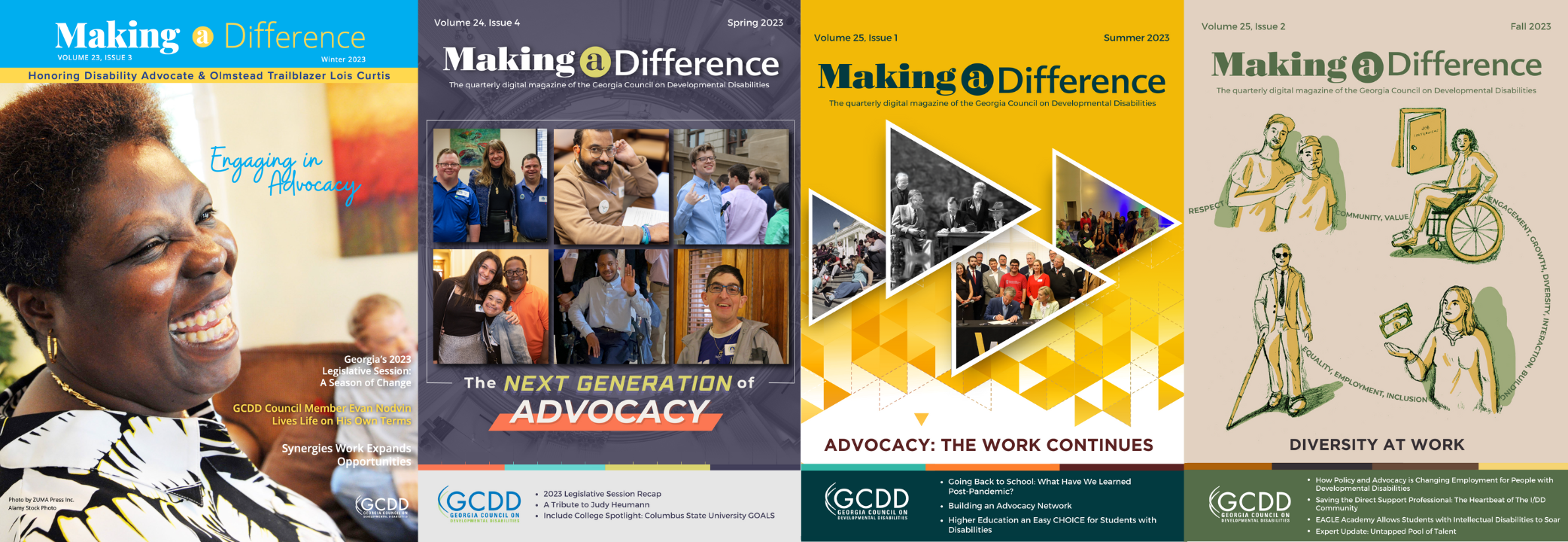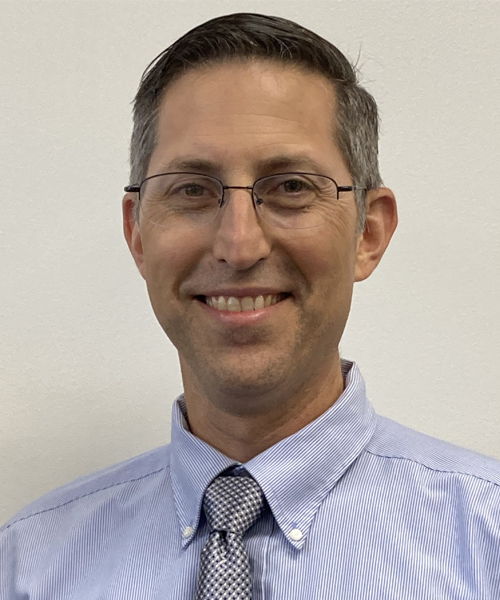GCDD FFY 2022-2023 Annual Report

The mission of the Georgia Council on Developmental Disabilities (GCDD) is to bring about social and policy changes that promote opportunities for persons with developmental disabilities and their families to live, learn, work, play and worship in Georgia communities.
This annual report presents examples of the GCDD’s impact through its funding to support initiatives with statewide partners, and GCDD’s public policy and communications work which has led to a positive impact within communities across Georgia during federal fiscal year (FFY) 2022-2023.
GCDD Making an Impact through our Work with Partners
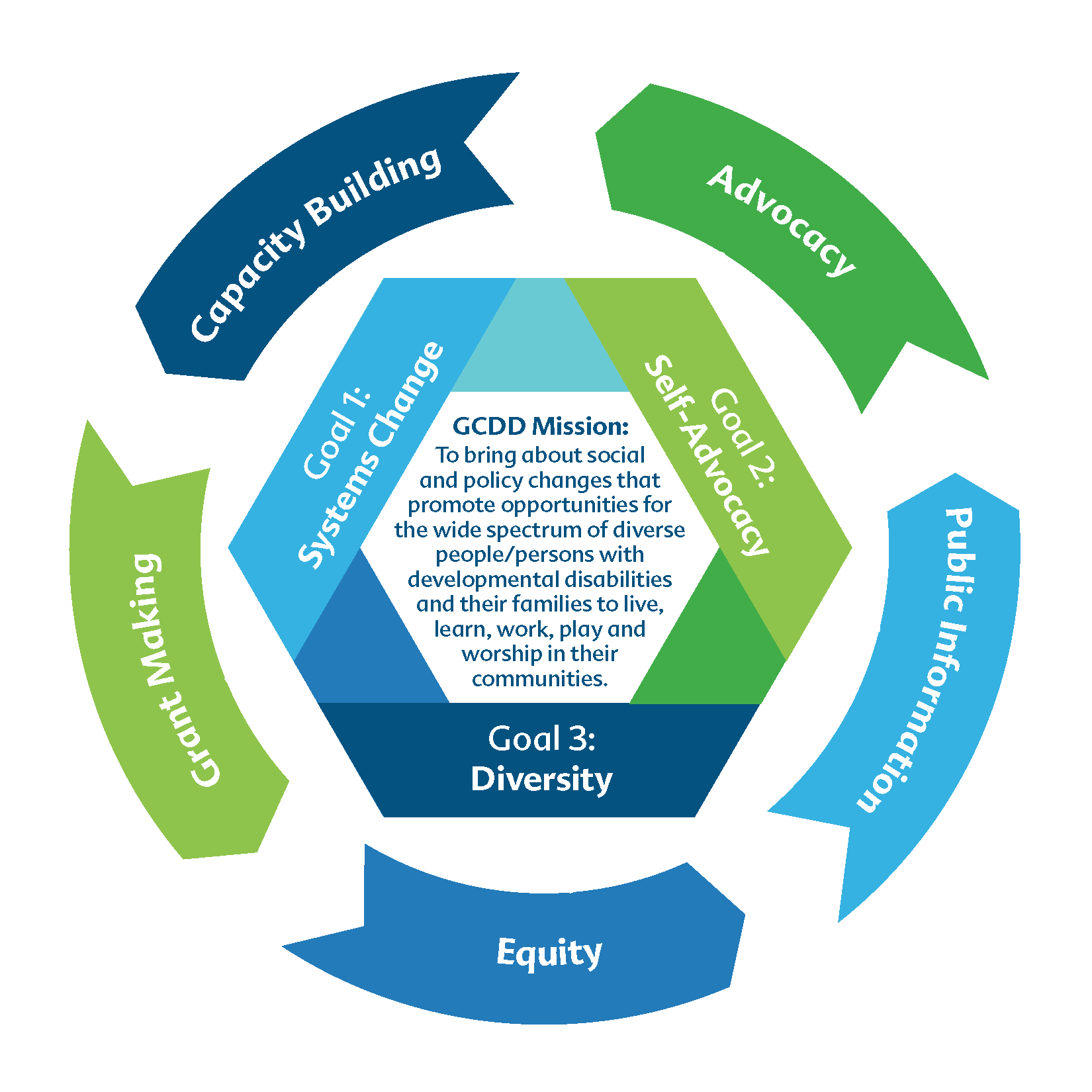 GCDD’s work is guided by its Five-Year Strategic Plan that outlines the goals and objectives to determine what GCDD will work on to build a more inclusive, integrated state for people with developmental disabilities. The three goals are:
GCDD’s work is guided by its Five-Year Strategic Plan that outlines the goals and objectives to determine what GCDD will work on to build a more inclusive, integrated state for people with developmental disabilities. The three goals are:
- Systems Change
- Self-Advocacy
- Effective and Efficient Organization
GCDD funds initiatives that fall under these goals. Projects funded during FFY 2022-2023 included:
- Advancing Employment Statewide Initiative
- Expanding Self-Advocacy
- Inclusive Post-Secondary Education
- Medicaid Advocacy
- School-to-Prison Pipeline
- Storytelling Project
- Supported Decision Making
This annual report highlights the accomplishments of several projects and initiatives of GCDD.
Advocacy Days at the Statehouse
As seen in previous legislative sessions, GCDD’s Advocacy Days was an integral program allowing individuals from the intellectual or other developmental disabilities (I/DD) community to use their voices to advocate for their needs to the Georgia legislature. As a way to increase participation, each Advocacy Day during the 2023 session consisted of a virtual day to help prepare advocates followed by the in-person day at the Georgia State Capitol. Over 200 advocates participated with many meeting their state representative in person. Advocates focused on educating and informing their legislators on inclusive post-secondary education, increase of Medicaid waivers and Direct Support Professionals (DSP) wages, and advancing Employment First in Georgia along with the ending of subminimum wages for people with I/DD.
GCDD Makes Big Strides for Inclusive Education Experiences for College Students
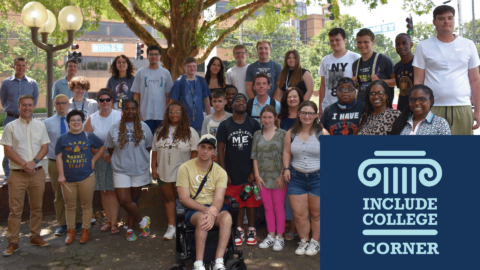 Inclusive college programs across the state offer students with intellectual and developmental disabilities (I/DD) a variety of experiences and opportunities for growth as they prepare for the next chapter of their lives. These programs are referred to as Inclusive Post-secondary Education (IPSE) and are integral to the success of students with I/DD to realize their dream of continuing their studies in a university or college setting with their peers.
Inclusive college programs across the state offer students with intellectual and developmental disabilities (I/DD) a variety of experiences and opportunities for growth as they prepare for the next chapter of their lives. These programs are referred to as Inclusive Post-secondary Education (IPSE) and are integral to the success of students with I/DD to realize their dream of continuing their studies in a university or college setting with their peers.
During the 2023 legislative session, one of GCDD’s Advocacy Days centered on IPSE and GCDD’s most significant legislative push was for advocates to ask for their representatives to support House Bill (HB) 185, sponsored by Representative Houston Gaines. HB 185 would supply grant-based financial support to those with intellectual disabilities to cover tuition and fees at a Georgia college with an IPSE program. Currently, only nine Georgia colleges have an 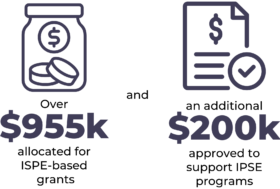 active IPSE program. Therefore, future advocacy will focus on expanding IPSE programs within Georgia colleges.
active IPSE program. Therefore, future advocacy will focus on expanding IPSE programs within Georgia colleges.
An unforeseen setback prevented HB 185 from passing through the House. However, with Representative Houston Gaines and the GCDD public policy team’s quick work, the bill’s language was included in Senate Bill 246, which was passed. Therefore, over $955,000 has been allocated in this year’s state budget to allow for students with I/DD to receive ISPE-based grants so they can attend one of the nine ISPE programs available in Georgia. Furthermore, an additional $200,000 was approved to support IPSE programs.
White Paper Identifies Technology Barriers for Georgians with Developmental Disabilities
 Georgians with developmental disabilities living in rural parts of the state experience a technology divide leading to unequal access to information. GCDD provided funding to Blue Fire, Inc. to research and write a technology access whitepaper. The data identified four key barriers to technology adoption and usage, including the lack of access to devices, access to the internet, support, and assistance in using devices, and training.
Georgians with developmental disabilities living in rural parts of the state experience a technology divide leading to unequal access to information. GCDD provided funding to Blue Fire, Inc. to research and write a technology access whitepaper. The data identified four key barriers to technology adoption and usage, including the lack of access to devices, access to the internet, support, and assistance in using devices, and training.
Emergency Preparedness Grant Supports Listening Sessions Across Georgia
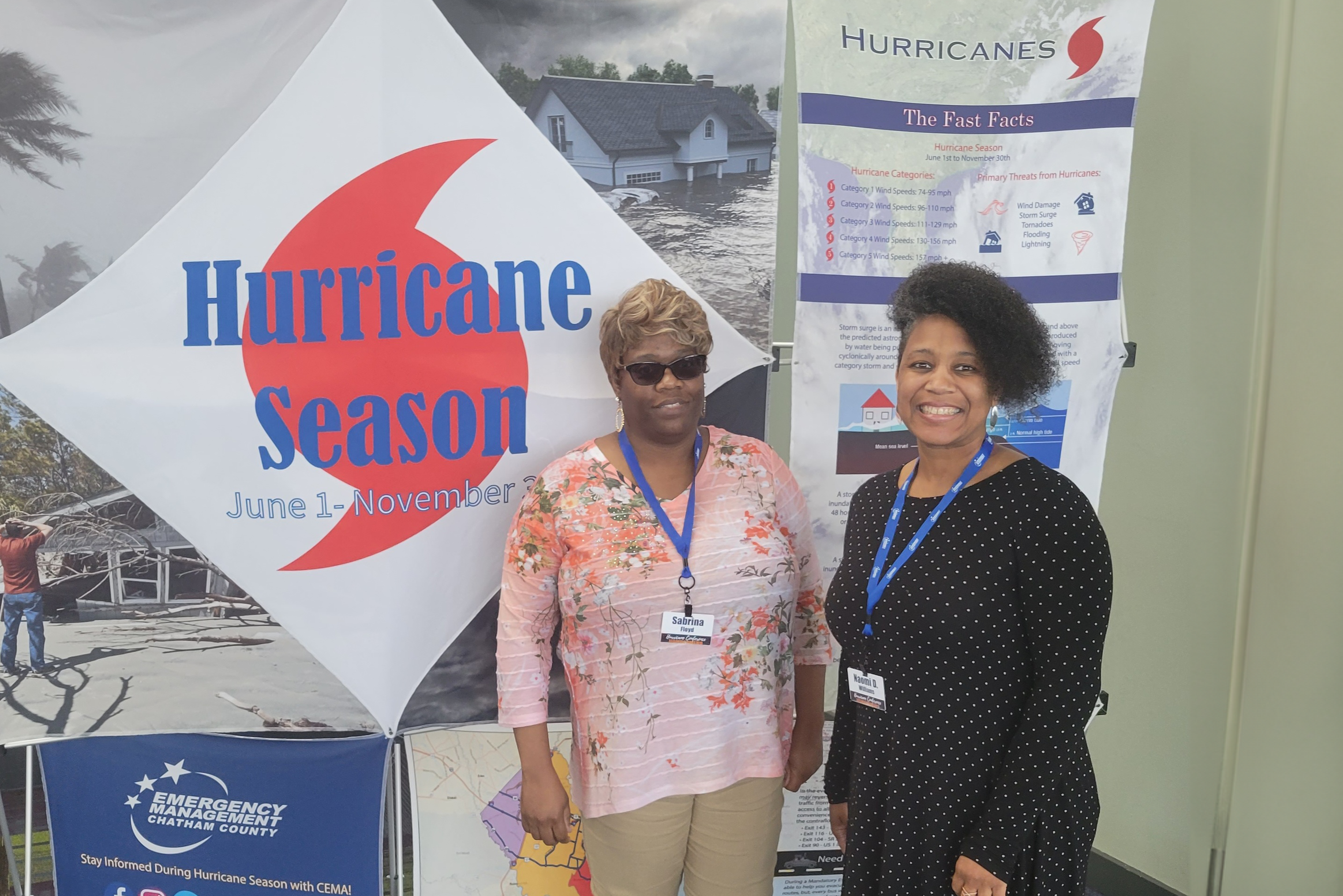 When it comes to people with disabilities, their medical, situational and mental health emergencies can be even more critical and difficult to navigate during an emergency, whether it’s a global pandemic, a local weather emergency, or a fall in their own home. To address this issue, Naomi Williams of Exceptional Living 101 co-hosted several in-person and virtual listening sessions on emergency preparedness throughout the state of Georgia to learn the experiences of people with disabilities and the next steps to help improve support during those times.
When it comes to people with disabilities, their medical, situational and mental health emergencies can be even more critical and difficult to navigate during an emergency, whether it’s a global pandemic, a local weather emergency, or a fall in their own home. To address this issue, Naomi Williams of Exceptional Living 101 co-hosted several in-person and virtual listening sessions on emergency preparedness throughout the state of Georgia to learn the experiences of people with disabilities and the next steps to help improve support during those times.
The listening sessions provide a person-centered approach to learning about and addressing emergency preparedness. The next step in the plan will be working with current partners and, perhaps, developing relationships with new ones, to develop effective ways to connect, share and disseminate the emergency preparedness tools and information. Williams envisions tangible resources including electronic and printable documents, as well as resources to provide plain language in news, media and television.
Making a Difference Quarterly Magazine
Learn more about GCDD’s impact through its work and collaboration by reading articles from the Council’s quarterly magazine, Making a Difference. Each issue features articles on public policy, interviews with experts in the disability field, highlights from inclusive post-secondary education (IPSE) programs in Georgia, self-advocate spotlights, resources, and more. The magazine is also available in Spanish and accessible audio. A podcast, Pinpoint serves as a supplement for the magazine.
D’Arcy Robb Named as GCDD’s Executive Director
 In 2022, the Georgia Council on Developmental Disabilities (GCDD) welcomed a new executive director, D’Arcy Robb, after a thorough search following the retirement of GCDD’s executive director, Eric Jacoboson. Robb came to GCDD with several years of experience working in the intellectual or other developmental disabilities (I/DD) community. She served as the Public Policy Director for GCDD in 2013 for nearly two years. She also served as the Public Policy Coordinator for the Commonwealth Council on Developmental Disabilities, GCDD’s equivalent in Kentucky. Robb also worked with the Georgia Vocational Rehabilitation Agency, the Department of Human Services’ Division of Family and Children Services, and some time in the private sector.
In 2022, the Georgia Council on Developmental Disabilities (GCDD) welcomed a new executive director, D’Arcy Robb, after a thorough search following the retirement of GCDD’s executive director, Eric Jacoboson. Robb came to GCDD with several years of experience working in the intellectual or other developmental disabilities (I/DD) community. She served as the Public Policy Director for GCDD in 2013 for nearly two years. She also served as the Public Policy Coordinator for the Commonwealth Council on Developmental Disabilities, GCDD’s equivalent in Kentucky. Robb also worked with the Georgia Vocational Rehabilitation Agency, the Department of Human Services’ Division of Family and Children Services, and some time in the private sector.
During Robb’s first year as executive director, her focus was two-fold: public policy advocacy and working with the GCDD staff and members to further the Council’s goals. She was heavily involved with advocating during the 2023 legislative session, and also spoke before a Senate study committee during a summer hearing about funding for more New Option Waiver Program (NOW) and Comprehensive Support Waiver Program (COMP) waivers and an increase in wages for Direct Support Professionals. In addition, she welcomed two new staff to GCDD’s team: Harry Nelson, Deputy Director and Charlotte Densmore, Public Policy Director. There was also a change in member leadership with Lisa Newbern being appointed as Council Chair and Nick Perry as Vice Chair.
After this year of transition into her new position, D’Arcy looks forward to the future and anticipates all the great work that GCDD can accomplish to improve the lives of Georgians with I/DD through the state.
Council Members, Partners, Staff
Thanks to over 50 Council members, partners, and staff who continue to serve as advocates for all persons with developmental disabilities by increasing opportunities for independence, inclusion, integration, productivity and self-determination.
Our Members
The GCDD’s activities are governed by a 27-member board, appointed by the Governor with at least 60 percent of the members being individuals with developmental disabilities and family members. Other members include policymakers that represent various agencies and organizations having a vested interest in persons with developmental disabilities. Our members represent different areas of the state of Georgia.
Our Partners
GCDD operates under the authority of the federal Developmental Disabilities Assistance and Bill of Rights Act of 2000 (DD Act) and is part of a statewide DD Network that consists of three partners in each state and territory authorized under the Developmental Disabilities Assistance and Bill of Rights Act of 2000 (the DD Act) and administered by the Administration on Developmental Disabilities (ADD).
Georgia's DD Network includes:
- Georgia Council on Developmental Disabilities (Developmental Disabilities Council)
- The Center for Leadership in Disability (University Centers for Excellence in Developmental Disabilities)
- The Institute on Human Development and Disability (University Centers for Excellence in Developmental Disabilities)
- Georgia Advocacy Office, Inc. (Protection and Advocacy System)
Our Staff
|
GCDD staff support members and handle day-to-day operations, administration, planning, advocacy and project monitoring. This year, two new staff members joined GCDD: Harry Nelson, Deputy Director and Charlotte Densmore, Public Policy Director. Read more about Harry and Charlotte.
|

GCDD also mourned the sudden passing of longtime Office Manager & Membership Coordinator, Kim Person. GCDD is forever grateful to Kim and her years of service to GCDD and the state of Georgia. Read more about Kim from GCDD Executive Director D’Arcy Robb.
|
Budget for Federal Fiscal Year 2022-2023

|
GCDD FY23 Fund Allocation (GCDD Budget) |
|
| ADMINISTRATION | $642,359.00 |
| EDUCATION | $525,000.00 |
| DIVERSITY/EQUITY | $257,450.00 |
| PUBLIC INFORMATION | $648,900.00 |
| SYSTEMS CHANGE | $1,201,831.00 |
| SELF ADVOCACY | $441,497.09 |
| TOTAL | $3,717,037.00 |
| Additional Funds (Special Projects not a part of our regular budget) | |
| FEDERAL PUBLIC HEALTH WORKFORCE GRANT | $95,319.00 |
| FEDERAL PROJECT SEARCH GRANT | $1,225,000.00 |
